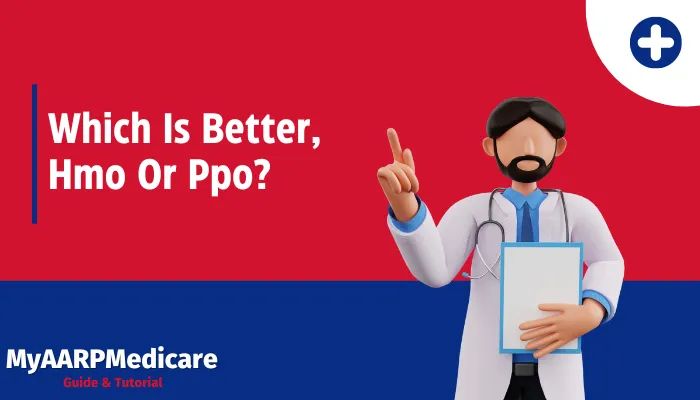Are you also confused about which is better, HMO or PPO? HMOs (Health Maintenance Organizations) typically offer lower costs in exchange for using in-network providers and having a primary care physician coordinate your care. PPOs (Preferred Provider Organizations) provide more flexibility to see any doctor but often come with higher premiums.
This guide will enlighten you on the two most common types of health insurance plans – HMOs and PPOs Their strengths and weaknesses will be revealed to help you determine which one is right for you.

Understanding Health Maintenance Organizations(HMO)
Choosing a health insurance plan is a daunting task. If you are looking for a relatively cheaper option that gives priority to preventive medicine, then an HMO may be your best choice. Essentially, HMOs provide healthcare in a different way focusing on prevention and containing costs.
HMO plans operate through a network of providers who have entered into contracts with them. Under this arrangement, you will be able to access specific doctors, hospitals and other medical facilities within the HMO system. In fact, this networking allows HMO’s to negotiate reduced rates with such healthcare providers leading to potential premium reductions for you.
A. Cost Champion
- HMOs usually win when it comes to affordability. A low monthly premium combined with predictable expenses such as co-pays for doctor visits makes budgeting easy.
B. Prevention is Key
- The emphasis by HMOs on prevention means that routine checkups and screenings may catch potential health issues early enough so as to save time, money, and stress later on.
C. Limited Choices
- With this type of policy, selecting your doctor feels like being lucky at a betting game. For instance, your loved doctor will not be available under the plan’s network.
D. Referral Roadblock
- Thinking of seeing a specialist? Brace yourself for the referral process. Ordinarily, one needs to seek permission from his or her PCP before going off the network.
Understanding Preferred Provider Organizations(PPO)
When it comes to health insurance matters, they are as complicated as identifying the exit out of a maze. In case you want your service providers to be on alternatives, then Preferred Provider Organization (PPO) plan will do for you. The coverage of PPOs is more than that of Health Maintenance Organizations. This means that a person can visit any doctor or hospital even if they have no link with this network.
However, some aspects need to be examined before making any decision concerning this flexibility in choosing your medical care professionals. The next section of this paper will discuss PPO plans further by looking at the advantages and disadvantages of using in-network and out-of-network providers under a PPO plan.
A. Pick Your Posse
- PPO offers wider options for doctors and specialists both within and out of the network. Being able to select one’s own healthcare providers is a significant advantage of this type of policy.
B. Referral Relief
- No more playing referral games! You don’t necessarily have to go through your PCP first before seeing a specialist under a PPO (but it may cost you).
C. Cost Considerations
- Normally, PPOs charge higher premiums per month as well as larger amounts for out-of-pocket costs. When you’re away from home and haven’t reached your deductible yet, be prepared to pay extra.
D. Preventive Care
- Although PPOs offer preventive care too; it might be different from that in HMOs where emphasis may not be so strong.
Comparison Between HMO vs. PPO
HMOs and PPOs have different strategies towards healthcare. HMO policies stress on affordability and preventative care within a confined network. PPOs offer more choice in terms of selecting any provider whether in network or out of network.
Still wondering which is better, HMO or PPO? Let’s compare both and find out as It comes down to what you want and value most.
| Factor | HMO | PPO |
|---|---|---|
| Cost | Reduced premiums, predictable expenditure levels | Higher premiums, potentially higher out-of-pocket costs |
| Provider Choice | Limited network, specialists require PCP referral | Wider network, greater provider choice flexibility |
| Preventive Care | Focuses more on prevention than curative treatment | Less emphasis on preventive care than on cure |
Case Studies: HMO vs. PPO
Let us observe how HMO & PPO schemes work!
Sarah the Steady
Sarah likes affordable healthcare and seldom goes to see a specialist. Due to the predictable cost structure of an HMO and its emphasis on preventive measures, she would fall into this category.
Mark the Mover
Being that he moves from place to place often in his employment duties, his best bet would be a PPO which would enable him to find any in-network doctor wherever he happens to land without any referrals.
The Final Verdict
We have weighed the advantages and disadvantages as far as HMOs versus PPOs are concerned. There is no one “better” plan though. The right choice depends upon your specific circumstances. Think about your health needs, financial plans, and how much power you want to have over the process of your healthcare.
So take a deep breath now, stop worrying about Which Is Better, Hmo Or Ppo evaluate what is important for you first, and use this information when choosing an insurance policy so that it can make it easier for you to live confidently!
Before we move further let’s discuss some additional consideration
1. Long-Term Health Needs
- Long-term health considerations should be taken into account when choosing between an HMO or a PPO. If there are chronic illnesses necessitating regular visits to specialists, a PPO might be more advantageous despite the higher costs. Easy referrals to specialists can save time and minimize anxiety.
2. Geographic Stability
- Your lifestyle and geographic stability also play a role in choosing a plan. If you tend to stay in one location and have established relationships with healthcare providers, an HMO might suit you well. On the contrary, if you frequently travel or expect to move often, a PPO offers greater choice.
3. Financial Planning
- Be careful about your financial situation. In spite of high premiums and out-of-pocket payments being low as compared to HMOs, investing in PPOs may be worthwhile for those expecting specialized treatments. It is important for them to balance immediate affordability against potential future health care needs.
4. Employer Contributions
- If you’re getting your insurance through an employer, consider their contribution to your premiums. Many employers pay substantial shares of HMO premiums making them attractive. However, some employers offer competitive contributions towards PPO plans too which may influence your decision.
Real-Life Scenarios
Let us observe how HMO and PPO plans work out in day-to-day life so we can have a good understanding about which is better, HMO or PPO?
Family Considerations
HMOs are more suited for families with younger children as they emphasize preventive care and cost less in terms of regular check-ups and vaccinations that are easier when there are fixed co-pays and low premiums.
Individual Considerations
Those without dependents or single people perhaps may prefer PPOs because they allow them to make their own choices of healthcare service providers including specialists without being referred by anyone else. For such persons, control over one’s health care decisions may matter most as independence becomes vital here.
Very Old People
Very old people have to choose between HMO and PPO based on their individual medical needs. Consequently, for those requiring specialized care due to multiple health problems, PPOs can be more preferable while HMOs can be helpful in meeting the needs of patients requiring constant attention like routine services.
Conclusion
You cant exactly know which is better, HMO or PPO? But you should know the core differences between HMO and PPO is a good step towards understanding them. Finally, assess your health requirements or necessities alongside financial status and personal principles so that you do not make hasty choices.
In fact, when you think about it this way, on one hand, an HMO would be able to provide cost-effective preventive care and on the other, a PPO would offer a broader choice of providers, thereby making the right plan available to manage individuals with confidence in their own ability to take care of themselves.
